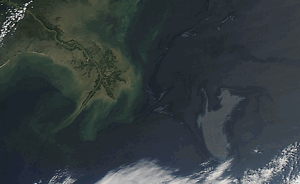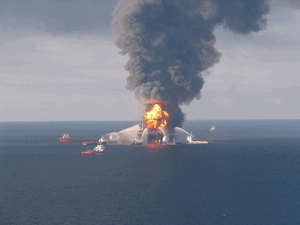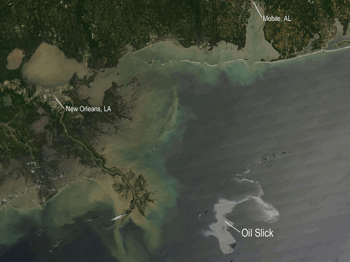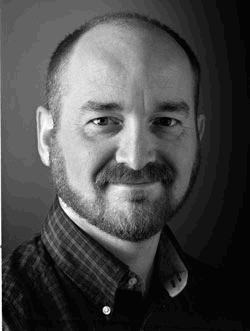Oil Spill Clouds Support for Offshore Drilling
Air Date: Week of April 30, 2010
 |
Tons of crude spewing from an oil rig in the Gulf of Mexico has given some reason to reconsider President Obama's recent decision to expand oil and gas exploration off the nation's Atlantic and Gulf coasts. Host Jeff Young talks with St. Petersburg Times reporter Craig Pittman about the growing opposition to offshore oil drilling.
Transcript
YOUNG: From the Jennifer and Ted Stanley Studios in Somerville, Massachusetts—this is Living on Earth. I’m Jeff Young. Offshore energy splashed into the headlines this past week with a wind power announcement for Nantucket Sound and a disastrous oil spill in the Gulf of Mexico.
NAPOLITANO: We’ll be taking a very close look at efforts underway, particularly to minimize the environmental risks in the area affected by the leaking oil.
SALAZAR: Cape wind will be the United States’ first offshore wind farm. Supplying clean power to homes and businesses in Massachusetts while creating good jobs here in America.
YOUNG: That’s Interior Secretary Ken Salazar approving the Cape Wind Project after nine years of controversy. We’ll have analysis of what that might mean for the country’s nascent offshore wind industry.
But first, more on the spill in the Gulf and the fallout for offshore drilling. Just weeks ago, President Obama announced his plan to open more of the country’s coasts to drilling. Here’s how the president explained that decision in early April.
OBAMA: It turns out by the way that oilrigs today generally don't cause spills, they are technologically very advanced.

The Deepwater Horizon Platform fire April 20th (Courtesy of the U.S. Coast Guard)
YOUNG: Now, with eleven workers dead and a desperate scramble to prevent an ecological catastrophe, many politicians are rethinking their position. Florida’s Gulf Coast is the frontline in this debate. If drilling expands it would likely happen first in the Eastern Gulf. That’s where Craig Pittman covers the environment for the St. Petersburg Times. Pittman says public opinion in Florida is, like the spill, a fluid situation.
PITTMAN: There has definitely been an evolution in the public attitude. In the late ‘80s, early ‘90s, I covered public hearings on offshore drilling where it would draw hundreds of people from all walks of life. You’d see skate punks with Mohawks standing next to button-down guys from the chamber of commerce, republicans and democrats joining forces, everybody saying we don’t want drilling off our shores here in Florida—that was the third rail of Florida politics.
But then came the summer of four-dollar gasoline and people started reconsidering that position, and saying well, gee if the tourists can’t afford to drive down here in the first place, what’s the point of having these clean beaches? You know, maybe it’s worth the risk.
YOUNG: So how do you think this is going to affect public opinion in Florida?

The oil slick emerging from the accident in the Gulf of Mexico days after the accident. (Courtesy of NASA)
PITTMAN: It’s as if the third rail of Florida politics has suddenly become a live wire again. It seems to have push a lot of people who were saying I’m open to the idea of drilling to say ok, now we’ve seen what it looks like, maybe it’s not such a good idea. The most immediate effect was that governor Charlie Crist who is running for the U.S. Senate announced that he is rethinking his support for offshore drilling.
CRIST: Well, if this doesn’t give somebody pause there’s something wrong I think. This is as I understand it a pretty new rig, and as I’ve always said it would need to be far enough, clean enough, and safe enough. I’m not sure that this was far enough, I’m pretty sure it wasn’t clean enough, and it doesn’t sound like it was safe enough.
PITTMAN: He had said during the 2008 presidential race when he was being considered for vice president by John McCain that he was open to the idea of offshore drilling. That was his mantra, he said, I’ll support it if it’s clean enough, safe enough, and far enough away to protect the beaches.
Obviously now we have a spill very far away from Florida that is drifting closer and closer to our shores and he’s saying maybe there’s not a place that’s far enough away. So he seems to be staking out his own course in order to separate himself from some of the more conservative elements of the Republican Party.
YOUNG: So you’re current senators, senators LeMieux and Nelson—where do they stand on this, and where’s the rest of the congressional delegation you think?

St Petersburg Times Reporter Craig Pittman.
PITTMAN: Senator LeMieux said that he would like to find out what sort of safety requirements should be changed in order to make sure this doesn’t happen again. Senator Nelson who is a long-time opponent of offshore drilling in the eastern Gulf of Mexico has seized on this issue as you might expect he would and said we need a full investigation, we think the oil companies have not been telling the truth about their safety record, and we think this is a further reason for trying to persuade president Obama to back off his plan to open up more of the eastern Gulf to drilling.
In fact, two of our congressmen joined forces—republican and democrat—to send the president a letter saying back of your plan, we don’t want it close to Florida, we don’t like what we’re seeing out there.
YOUNG: So, if part of the deal for trying to get a comprehensive energy and climate bill through Congress is to include offshore drilling, is that now vulnerable you think because it sounds to me like senator Nelson of Florida has a little more ammo to push back against.
PITTMAN: Absolutely. And he’s not alone—two senators from New Jersey have also weighed in and said look what happened, this is terrible, and we don’t want it off our shore, and they are joining senator Nelson in calling for congressional hearings and investigation.
YOUNG: So where do you see this heading? Is this yet another temporary turn in public opinion for Florida and for the nation? Or do you think this might have a more lasting impact, this accident we were watching unfolding in the Gulf?
PITTMAN: I think it depends on how big it gets and how bad it gets. I mean people still talk about the Santa Barbara spill from California, people in the Gulf still talk about the big Ixtoc spill off of Mexico that went on for two months and coated the beaches of Texas with tar balls for years afterwards. The big ones people remember and it affects political patterns for a long time to come. If on the other hand it winds up being easy to clean up, well, then it’ll be forgotten by the next election cycle, probably.
YOUNG: Do you think this spill in the Gulf is going to be the—is this the end of “drill, baby, drill” or is it just now going to ring to people’s ears as “spill, baby, spill”?
PITTMAN: That’s a really good question. Let me answer it by saying this: we did a search through the transcripts of all the people who had been saying “drill, baby, drill” for the past two years: Newt Gingrich, Shawn Hannity, Rush Limbaugh, Glenn Beck—all those folks—Sarah Palin; we can’t find that any of them have commented on the spill yet. There’s been a roaring silence.
YOUNG: Craig Pittman is a staff writer for the St. Petersburg Times. Thanks very much!
PITTMAN: You’re welcome.
Links
For more on Craig Pittman and his work click here.
Click here to hear a webextra on how wildlife will be affected by the Gulf oil spill
Click here for Carl Safina on Blue Fin Tuna and the Oil Spill
Living on Earth wants to hear from you!
Living on Earth
62 Calef Highway, Suite 212
Lee, NH 03861
Telephone: 617-287-4121
E-mail: comments@loe.org
Newsletter [Click here]
Donate to Living on Earth!
Living on Earth is an independent media program and relies entirely on contributions from listeners and institutions supporting public service. Please donate now to preserve an independent environmental voice.
NewsletterLiving on Earth offers a weekly delivery of the show's rundown to your mailbox. Sign up for our newsletter today!
 Sailors For The Sea: Be the change you want to sea.
Sailors For The Sea: Be the change you want to sea.
 The Grantham Foundation for the Protection of the Environment: Committed to protecting and improving the health of the global environment.
The Grantham Foundation for the Protection of the Environment: Committed to protecting and improving the health of the global environment.
 Contribute to Living on Earth and receive, as our gift to you, an archival print of one of Mark Seth Lender's extraordinary wildlife photographs. Follow the link to see Mark's current collection of photographs.
Contribute to Living on Earth and receive, as our gift to you, an archival print of one of Mark Seth Lender's extraordinary wildlife photographs. Follow the link to see Mark's current collection of photographs.
 Buy a signed copy of Mark Seth Lender's book Smeagull the Seagull & support Living on Earth
Buy a signed copy of Mark Seth Lender's book Smeagull the Seagull & support Living on Earth

